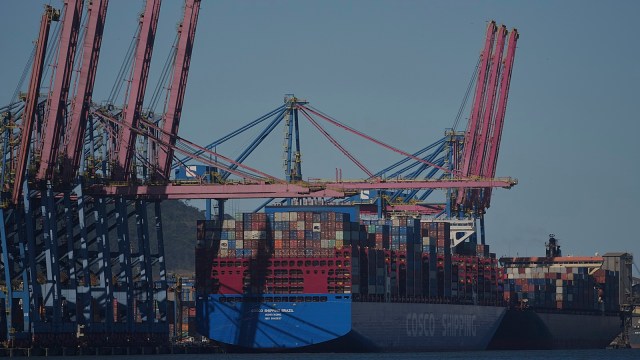The US has sanctioned eight India-based companies and five Indian nationals as part of its latest Iran-related sanctions action targeting entities engaged in trade of Iranian oil, petroleum products, and petrochemicals, and those identified as part of a shipping empire controlled by Mohammad Hossein Shamkhani — the son of Ali Shamkhani, a top political advisor to the Supreme Leader of Iran.
In the latest action, announced Wednesday, the US Department of the State imposed sanctions on 20 entities and identified 10 vessels as blocked property. Simultaneously, the US Department of the Treasury’s Office of Foreign Assets Control (OFAC) designated more than 50 individuals and entities and identified more than 50 vessels that are part of Hossein Shamkhani’s network.

Six Indian companies are part of the State Department as well as the OFAC sanctions lists. These include Chennai-based Kanchan Polymers and five Mumbai-based firms—Alchemical Solutions (also known as Chemform Trading), Ramniklal S Gosalia and Company, Jupiter Dye Chem, Global Industrial Chemicals, and Persistent Petrochem. According to the State Department, these companies imported Iranian-origin petrochemicals—which are under US sanctions—worth millions of dollars. Two more Indian companies—Mumbai-based Ensa Ship Management and Surat-based Shreeji Gems—feature in the OFAC’s designations over their alleged connections with Hossein Shamkhani’s network.
The five Indian nationals designated by the OFAC are Mohamed Rafeek Habibullah, Jacob Kurian, Anil Kumar Panackal Narayanan Nair, Pankaj Nagjibhai Patel, and Elyas Jafer Tambe.
UAE-based Habibullah has been designated by the OFAC for “operating in the petroleum sector of the Iranian economy”, while Nigeria-based Kurian and India-based Nair were identified as shareholders and directors of Marshall Islands-based Neo Shipping, which owned a vessel “managed on behalf of Hossein’s network”. According to the OFAC, UAE-based Patel “has served as an executive on several shipping companies in Hossein’s network”; Patel is a director of Shreeji Gems. Tambe—also based in the UAE—has been associated with several shipping companies “tied to Hossein’s network” and held various roles with multiple network companies.
Meanwhile, the embassy of Iran in India hit out at the US, accusing it of weaponising the economy and using sanctions as tools to dictate its will on other countries.
“The United States continues to weaponize the economy and use #sanctions as tools to dictate its will on independent nations such as Iran and India and impede their growth and development. These coercive discriminatory actions violate the principles of international law and national sovereignty, representing a modern form of economic imperialism. Resisting such policies is a stand for a more powerful emerging non Western-led multilateral world order and a stronger Global South,” the Iranian embassy in India said in a post on social media platform X.
The latest action by Washington is part of the Donald Trump administration’s “maximum pressure campaign” on Iran, which has now seen multiple rounds of sanctions against individuals and firms over the past few months. Indian nationals and firms have featured on the list of sanctioned individuals and entities in earlier rounds as well. For instance, a UAE-based Indian national Jugwinder Singh Brar and four of his firms were sanctioned by the US for operating “shadow fleet” vessels that transported “Iranian oil on behalf of the National Iranian Oil Company (NIOC) and the Iranian military”, according to the OFAC.
Story continues below this ad
Even prior to Trump’s administration’s campaign against Iran’s oil and petroleum products trade, a few Indian companies had been placed under sanctions by the previous US administration for involvement in energy transportation and trade through the so-called shadow fleet of tankers. For instance, in October, India-based Gabbaro Ship Services was sanctioned for alleged involvement in transportation of Iranian oil. In August and September of last year, three India-registered shipping firms were sanctioned by the US over their alleged involvement in transporting liquefied natural gas (LNG) from Russia’s Arctic LNG 2 project, which is under American sanctions.
Most of the Indian companies that have been sanctioned by the US over purported violations of energy sector-related sanctions appear to be small and hitherto little-known entities set up in recent years, and not large enterprises. To be sure, India does not import any crude or petroleum fuels from Iran, given that Tehran’s oil and gas sector is under sanctions imposed by Washington during the first Trump administration.
On the latest sanctions action, the US State Department said, “The Iranian regime continues to fuel conflict in the Middle East to fund its destabilizing activities. Today, the United States is taking action to stem the flow of revenue that the regime uses to support terrorism abroad, as well as to oppress its own people. The Department of State is imposing sanctions on 20 entities engaged in Iranian petroleum, petroleum products, or petrochemical trade and is identifying 10 vessels as blocked property”.
Commenting on the action by the OFAC, US Treasury Secretary Scott Bessent said, “The Shamkhani family’s shipping empire highlights how the Iranian regime elites leverage their positions to accrue massive wealth and fund the regime’s dangerous behaviour.”
Story continues below this ad
“The over 115 sanctions issued today are the largest to-date since the Trump Administration implemented our campaign of maximum pressure on Iran. These actions put America first by targeting regime elites that profit while Tehran threatens the safety of the United States,” Bessent added.
The OFAC alleged that Hossein Shamkhani “leverages corruption through his father’s political influence at the highest levels of the Iranian regime to build and operate a massive fleet of tankers and containerships”. This network transports oil and petroleum products from Iran and Russia, as well as other cargo, to buyers around the world, generating tens of billions of dollars in profit, it added.

































